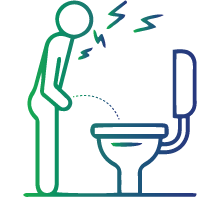
Calcium/Creatinine Ratio, Spot Urine
Calcium/Creatinine Ratio, Spot Urine
The calcium/creatinine ratio, spot urine test is done to establish the level of calcium and creatinine in the urine. Increased urinary calcium excretion (hypercalciuria) is said to be a key contributor to kidney stone disease and osteoporosis. Spot urine samples provide useful indication as to whether hypercalciuria is present. Thus, it is recommended to undergo a calcium/creatinine ratio, spot urine test to find out whether the person is susceptible to hypercalciuria and subsequent kidney stones
Symptoms of hypercalciuria

Blood in urine (hematuria)

Painful urination (dysuria)

Frequent urination

Abdominal pain

Kidney stones

Urinary tract infections (UTIs)
What is Calcium/Creatinine Ratio, Spot Urine test used for?
This test is done to determine if an individual is suffering from any of the following conditions

Hyperthyroidism

Vitamin D intoxication

Kidney stones

Osteoporosis
Test preparation
No special preparation is required for the calcium/creatinine ratio, spot urine test
Interpretation of the Test Results
The normal reference value of calcium/creatinine ratio, spot urine is <0.14 milligrams per decilitre (mg/dL). Values above 0.20 mg/dL indicate hypercalciuria. A decreased ratio may be related to hypocalciuria or other kidney issues
FAQs
How is the sample collected for the calcium/creatinine ratio, spot urine test?
A urine sample is used for this test. You will be given a sterile container by your healthcare provider to collect a urine sample. Midstream urine collection is the proper technique for taking a urine sample. The first few urine drops should be discarded because they could contain microorganisms that are present on the genital surface. It is advised that you clean the area around your genitalia before taking a urine sample
Are there any risks associated with the calcium/creatinine ratio, spot urine test sample collection?
Urine sample collection for calcium, spot urine test does not pose any risks
What causes high calcium creatinine ratio in urine?
Renal leak hypercalciuria is characterized by secondary hyperparathyroidism brought on by an inevitable loss of calcium in urine. Patients with renal calcium leak typically have a high calcium/creatinine ratio (> 0.20), and they are more likely to have medullary sponge kidney than other hypercalcemic patients
How can one treat hypercalcemia?
Hypercalcemia can be treated through medication by understanding the underlying cause. If it is due to high calcium levels, it can be treated by taking calcitonin, which controls calcium levels. In case of excess of vitamin D, prednisone may be administered
Is hypercalcemia hereditary?
Familial hypocalciuric hypercalcemia (FHH) is an inherited condition that can cause hypercalcemia. This disorder is characterized by an excess of calcium in the blood due to malfunctioning calcium receptors. However, this condition does not cause symptoms and complications associated with hypercalcemia

